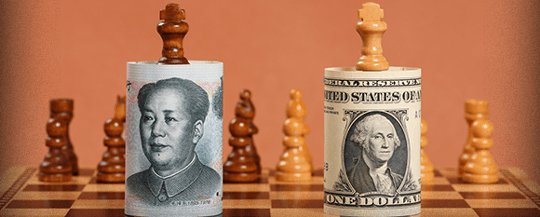The Next World War
“The World Today Looks Ominously Like It Did Before World War I.”
Thus ran a po-faced headline in The Washington Post, of recent vintage. But is it true? Is the world really on the verge of a possible war? And where would it start?
So we buckle on our armor… mount our steed… and prepare to confront these questions today…
The Great War — re-christened World War I in honor of its sequel — slammed the hatch on what many consider the first era of globalization. The Post:
From the mid-19th century to 1914, advances like steamships, the telegraph, the telephone and the Suez and Panama canals dramatically shrunk distances and increased communication, and the world underwent a period of rapid globalization.
But that first era of globalization had its discontents, much like today’s has its discontents. And by August 1914 it was clear that Germans weren’t really citizens of the world after all but citizens of Germany… the French, citizens of France… and the English of England.
Josh Feinman is chief global economist for Deutsche Asset Management. He produced a recent report called Backlash Against Globalization: Déjà Vu? From which:
“The first great globalization wave, in the half-century or so before WWI, sparked a populist backlash too, and ultimately came crashing down in the cataclysms of 1914–1945.”
History seems to run in cycles then. Not perfectly — you can never step in the same river twice said Heraclitus — but close enough to sketch meaningful parallels.
Feinman again: “Modern globalization has been spurred by some of the same forces that powered the pre-WWI epoch: New technologies, an open, free-trade, rules-based world economic system underpinned by the leading power of the day, and a period of general peace among major countries.”
But is this second era of globalization nearing the end of the tether?
World War II was the world’s last great heavyweight fight — over 70 years ago. The globalization that followed — massive expansions in international trade, economic integration, communications — now seem permanent features of international life.
But those same globalist forces seemed permanent features of international life before August 1914. On the eve of WWI one leading expert of the day even gloated that because of such extensive economic interdependence, “There will never be another war between European powers.”
Go ahead and laugh. This time’s different, you might chortle. Of course it is. It always is…
As in 1914, we find the forces of globalism in swift retreat. The British people have voted themselves out of the EU. The American people have voted Donald J. Trump into the White House. Nationalist, anti-globalization movements surge in France, Italy, here, there, everywhere.
Many Europeans are concluding once again that they’re not citizens of the world or even citizens of Europe — but Frenchmen, Englishmen, Italians… Germans. Maybe nationalism isn’t quite as dead as the one-worlders assumed.
Does that mean World War III breaks out tomorrow, if at all?
No, it doesn’t. But WWI started by accident. Some moonbat knocked off a couple royals in Sarajevo one day. Ultimatums were issued, sides were drawn. Armies mobilized. Next thing they knew Germany was marching on Belgium and four years later over 17 million were dead and the war to end all wars gave way to the peace to end all peace. That’s what French PM Georges Clemenceau called the disastrous Treaty of Versailles that led to WWII.
Few actually wanted war in 1914. But they got it anyway.
And who’s to say a similar accident today couldn’t trigger another great power war?
We wrote about it last week. Russia’s the great bugbear again. The U.S. just deployed 4,000 troops to Poland, right up to the Russian frontier. U.S. troops stationed in the Baltic are within shouting distance of St. Petersburg.
Maybe someone gets an itchy trigger finger one day and shoots down a Russian plane by mistake. Does Russia respond? How? And does the U.S. respond to that response?
It’s not difficult to imagine events spiraling quickly. No one wants to blink first.
And it seems tensions in the seas off China mount by the day. Territorial disputes between China and its neighbors, including treaty allies of the United States, can potentially result in a shooting incident that puts Uncle Sam in a real fix — come to the aid of an ally — or back down and lose all credibility in the world.
Or what if U.S. and Chinese forces stumble their way into an incident of their own? How does Trump respond? The Chinese president?
War is much like love, said the great H.L. Mencken — easy to start… but very hard to stop.
That was the great lesson of WWI. We only hope it’s a lesson that doesn’t have to be learned all over again…
Regards,
Brian Maher
Managing editor, The Daily Reckoning



Comments: